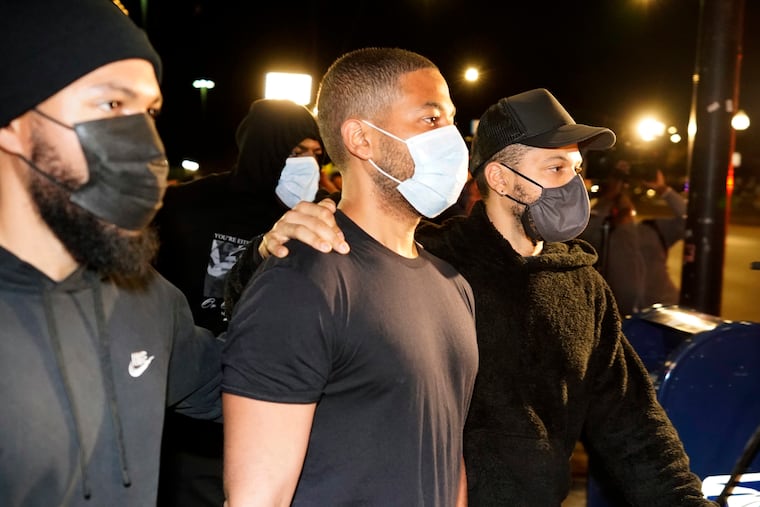Both the right and left embrace misinformation. It’s human nature.
The new N.J. media literacy bill is great. But if Republicans think it's only correcting their falsehoods — and giving Democrats a free pass — they’ll dismiss it as left-wing propaganda.

You know who you are.
If you’re a Democrat, you might have breathed a sigh of relief when it was reported that New Jersey had become the first state to require media education in K-12 schools. “Right on,” you said to yourself. “That’s the only way students will learn to reject Republican misinformation, like the ‘stolen’ 2020 election and the ‘harm’ of COVID-19 vaccines.”
You’re right. And you’re wrong.
You’re right that we need education to teach kids how to identify the falsehoods and distortions that pulse through our media. And yes, the stolen election and COVID-19 conspiracy theories were more likely to be believed by people in the GOP.
But you’re wrong if you think Republicans are the only producers and consumers of misinformation. Democrats engage in that game, too. All of us are subject to confirmation bias: We believe stories that reinforce our worldview, whether they’re true or not. And unless we admit that, the media education movement in New Jersey and elsewhere will get bogged down in the same partisan warfare that it aims to alleviate.
“All of us are subject to confirmation bias: We believe stories that reinforce our worldview.”
When researchers gave people false news stories about Barack Obama and Donald Trump — either that they had each donated $50 million to charity, or they were each facing criminal charges around voter fraud in 2016 — Democrats and Republicans were equally likely to believe the misinformation that made their favored candidate look good and the other guy look bad.
A May 2020 poll found that 44% of Republicans thought Bill Gates wanted to use COVID vaccines to implant microchips in people, whereas 19% of Democrats agreed. Although you may see this as a slam dunk that Republicans are more likely to get sucked into fake news, almost one out of five Democrats were right there with them. If you think Democrats are the party of truth and reason, you need to explain why so many of them embraced an absurd — and false — conspiracy theory about Gates.
You also need to explain why so many people on the left continue to believe that the Pulse nightclub in Orlando, Fla., was attacked because it was a gathering place for LGBTQ people, that Matthew Shepherd was killed in Wyoming because he was gay, and that Jacob Blake was unarmed when he was shot by police in Kenosha, Wis. All of these stories were reported by credible news outlets, then disproven by further investigation.
According to evidence from the Orlando shooter’s wife that emerged two years after the event, he had no idea that Pulse was a gay nightclub; pledging to exact revenge for U.S. anti-terror policies abroad, he just sought a crowded place to kill Americans. An investigative journalist who spent 13 years interviewing 100 people about Shepherd’s murder concluded that his murder was not because of his sexuality, and could instead be tied to crystal meth. And although news stories when Blake was shot in the back by police in August 2020 reported that he was unarmed, Blake himself revealed in a TV interview months later that he had a knife. He had also been arrested before for resisting police with a knife.
So why do so many of my fellow Democrats still repeat discredited myths about all three episodes? Because, paradoxically, truths can make you vulnerable to lies. It is true that LGBTQ people are more likely to suffer bullying and harassment than straight people are. And it is also true that unarmed Black people are more likely to be shot by police than white people are.
» READ MORE: Gov. Phil Murphy signs a law to make N.J. first state to require media literacy for K-12
It doesn’t follow that every allegation of anti-gay or anti-Black bigotry is true, of course. But the more you are told about discrimination against these groups, the more likely you are to believe anything that reinforces that narrative — even when the facts say otherwise. Think how many people believed Jussie Smollett when he lied about being a victim of a hate crime in Chicago in 2019.
If we continue to pretend that misinformation only infects the other team, our efforts to combat it in schools will come to naught. Of course, we need teachers to instruct kids about how to distinguish credible information from the fake kind. But if Republicans sense that we’re only correcting their falsehoods — and giving Democrats’ distortions a free pass — they’ll dismiss media education as left-wing propaganda.
That seems to be what has happened in Delaware, which recently passed a bill that requires the Department of Education to develop media literacy standards for K-12 schools. “You see, Republicans want the next generation to be as gullible and naive when it comes to gaslighting and fake news as they have been,” a Delaware Democratic website editorialized last year, condemning GOP resistance to the measure. “If you are skeptical and think for yourself, Fox News has less impact.”
They’re right that there’s a lot of misinformation on Fox News. But they’re wrong if they think Fox is the only offender.
Fake news of all stripes will have less impact if we teach our kids how to identify it. And that starts with admitting that none of us are immune to it.
Jonathan Zimmerman teaches education and history at the University of Pennsylvania. He is the author of “Whose America?: Culture Wars in the Public Schools,” which was recently published in a revised 20th-anniversary edition by the University of Chicago Press.